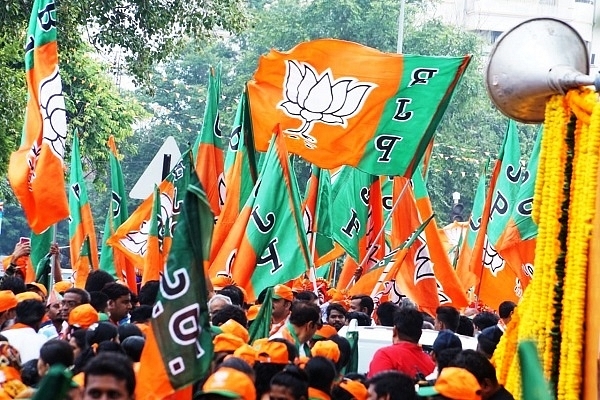Politics
All The Takeaways And Lessons From Uttar Pradesh By-Elections
- The BJP still continues to lead over the SP and BSP. BSP would find it difficult to make a comeback in the near future. Muslims of Uttar Pradesh are almost entirely behind the SP.

BJP Flags (Representative Image)
By-elections to state assemblies have a record of generally favouring the ruling dispensations. In many cases where assembly elections have thrown out incumbent governments, preceding by-elections have still shown this conservative trend.
This is probably because unlike the full term elections which are a referendum on incumbent governments, in mid-term elections, voters generally try to seek the patronage of the ruling party.
But Uttar Pradesh is different because it keeps lapsing into caste politics after occassional bursts of emotive mandates. Or that, more or less, has been the case, until five years back.
It is in this context that the outcome of assembly by-elections in Uttar Pradesh gains significance.
After registering outstanding performances in the 2014 Lok Sabha and 2017 assembly elections, the ruling Bharatiya Janata Party (BJP) got a rude shock when it lost three Lok Sabha by-polls last year in Gorakhpur, Phulpur and Kairana.
Not far away from the 2019 general elections, these results had affected the morale of party workers and Chief Minister Yogi Adityanath's standing as Gorakhpur had been his own constituency.
This time Adityanath was on ground and made sure that he canvassed in every single constituency which went to the polls.
The by-elections were also the first major test for newly appointed state president of the BJP, Swatantra Dev Singh who had started preparing for these elections long time back.
Though, when compared to the 2017 assembly elections, the party has registered a drop in overall vote percentage, the final tally has been quite impressive.
Along with ally Apna Dal (Sonelal), the BJP has won 8 out of 11 assembly seats.
Excepting Ghosi which saw a very close contest till the last round of counting, the victory margins of BJP and Apna Dal candidates have been comfortable. The by-poll results indicate an approval of Yogi Adityanath’s governance.
Despite losing the Rampur assembly seat, the BJP has managed to scare the daylights out of Azam Khan, so to speak. In a constituency which has more than 50 percent Muslim voters, Azam's wife, Tazeen Fatima, could manage to win by only 7000 and odd votes.
The remarkable thing about Rampur is that the Muslim candidates fielded by Congress and Bahujan Samaj Party polled a mere 4100 and 3400 votes. The results showed that consolidation of Hindu votes in Rampur was near complete in favour of BJP's Bharat Bhushan.
For the BSP which managed to secure 10 seats in last Lok Sabha elections, owing mostly to deft maneuvring in its alliance formation with Samajwadi Party, the by-poll results have come as a shock.
It could not open its account and its vote share plumetted in 9 out of 11 constituencies.
As for Congress, the overall vote percentage of 11.5 per cent appears as a consolation but two of its three candidates who have managed to save their deposits did so on their personal account.
Nooman Masood who lost to BJP's Kirat Singh in Gangoh assembly is Imran Masood's brother and Tanuj Puniya who finished third in Zaidpur is PL Puniya's son.
The by-poll results have enthused the Samajwadi Party.
Apart from winning three assembly seats, the party stood second in six constituencies. It wrested Zaidpur seat from BJP, improving its vote share from less than two percent in 2017 to 35.3 per cent this time.
The assembly by-poll was virtually a contest between BJP and SP. The results have come as a big relief to Samajwadi Party (SP) leader Akhilesh Yadav who had faced severe criticism from his father Mulayam Singh for party's alliance with BSP and strengthening the latter at its own cost.
The by-polls have also proved that Samajwadi Party remains the favourite party of Muslims in Uttar Pradesh. The extent of Muslim support for SP can be gauged by the fact that in Gangoh and Ghosi a large number of Muslims have voted for Hindu candidates of Samajwadi Party rather than go with Muslim candidates fielded by BSP.
An estimated 20,000 Muslim votes polled in favour of SP candidate Inder Sain is believed to have spoiled Congress Party's Nooman Masood's chances in Gangoh. Masood lost by 6000 votes.
An inspired Akhilesh has given a call for 250 seats in 2022 assembly elections. But a difference of 14 per cent vote share is too much to bridge, particularly in a triangular contest.
Though Yogi Adityanath has emerged as a winner leading his opponents by quite a distance, there are lessons still to be learnt.
Yogi can rest in the comfort of a divided opposition but small parties can nevertheless play a spolier. Om Prakash Rajbhar's Suheldev Bharatiya Samaj Party secured around 10,000 votes in Ghosi and Jalalpur. Though BJP managed to scrape through in Ghosi by about 1800 votes, the difference in Jalalpur could have put it neck to neck with SP and BSP.
Introducing ElectionsHQ + 50 Ground Reports Project
The 2024 elections might seem easy to guess, but there are some important questions that shouldn't be missed.
Do freebies still sway voters? Do people prioritise infrastructure when voting? How will Punjab vote?
The answers to these questions provide great insights into where we, as a country, are headed in the years to come.
Swarajya is starting a project with an aim to do 50 solid ground stories and a smart commentary service on WhatsApp, a one-of-a-kind. We'd love your support during this election season.
Click below to contribute.
Latest